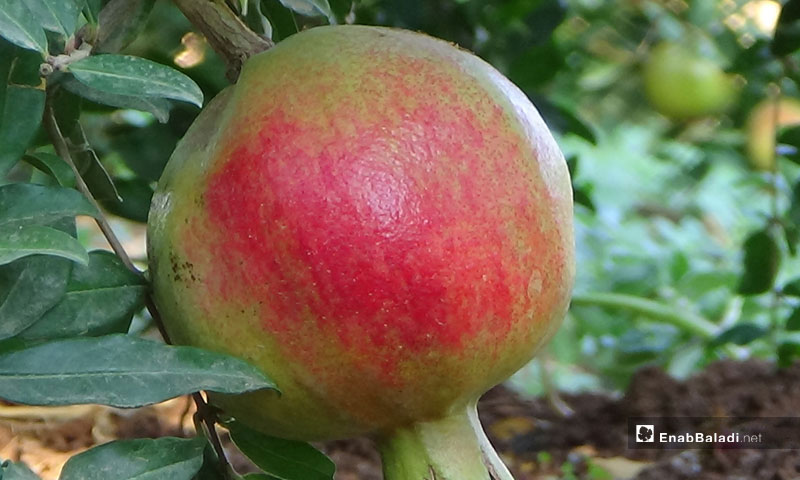



Following the weak grape harvest season in Daraa governorate, some of the area’s farmers feel optimistic about this year’s pomegranate season, overcoming a series of difficulties and the deterioration in the agricultural sector in the past a few years.
Pomegranate is viewed as a strategic seasonal crop, occupying wide agricultural areas in the place of grapevines in the last years, which turned it into the farmers’ main source of income despite the many difficulties facing it.
Closing the official border crossings and the absence of needed conditions for its cultivation have both led to a marked decrease in pomegranate crop production in the governorate, especially with the many losses that farmers suffered as a result for shutting down Nassib border crossing with Jordan.
The pomegranate farmers expect a rise in its prices this season, after the regime has controlled the strategic “Nassib” border and talks about allowing external export after the calm that started to reign over Southern Syria.
These developments are talking the agricultural factors back to what they used to be prior to war in the governorate, with securing fuel, fertilizers, irrigation water and other needs.
Pomegranate trees start to be productive at the age of two, while they grow older the production amount increases. This fruit is known for its ability to be stored for long periods that might reach six months under various climatic conditions.
Pomegranate is a basic ingredient in many foods and can be converted into long-lasting storage juice, which gives a distinctive taste to foods. It is also known as a fruit of different types that are all reach in sugar.
Khalil al-Hassan, owner of a pomegranate farm in Daraa, said that the high prices of fuel and fertilizers and the security obstacles imposed on traders are the main reasons for the decline in fruit production, coupled with the lack of irrigation water after the spread of random water wells.
Storage plays an important role in the success of production and marketing, which the governorate merchants suffer from due to the absence of electricity needed to operate refrigerators, according to “Abu Anas,” one of the area’s merchants, who complained of the absence of electricity during the past years because of the battles and shelling, which led to his reluctance to store pomegranate and resulted in significant losses in the trade, as it was based on the export of pomegranate through Jordan to the Gulf States.
But farmers are now trying to re-operate refrigerators and secure needed electricity, in addition to the efforts they are making to save their crops from environmental hazards and wild animals.
In the area, wild boars live in the valleys where springs are abundant, because of the dense reed forests amidst which they hide during the day. However, they leave their hiding in herds at night and damage the corps, especially pomegranates, the fruit they like the most.
This damage has been an obsession for farmers, which made them seek solutions to avoid the risk of the wild boar and protect their crops from repeated invasions. All the possible solutions are costly, as they are mainly based on fencing their lands.
This protection method raises the cost of production, said farmer Ahmed Hilal, who estimated that fencing five dunums of land might cost about 300 thousand Syrian pounds.
However, he pointed out to another solution, hiring a guard to observe the crops until maturity and sell, and this is a viable solution because the wild boar is a non-aggressive animal and escapes upon feeling the presence of humans. The cost of hiring a guard is about 1500 Syrian pounds per night.
The optimism of the farmers and their movement to save their crops depends on the improvement of the security conditions and the opening of the Nassib crossing. The two sides, the Jordanian and the Syrian, are still flirting with each other through statements concerning the reactivation of the border crossing, while no serious, on ground, steps have been undertaken.
if you think the article contain wrong information or you have additional details Send Correction